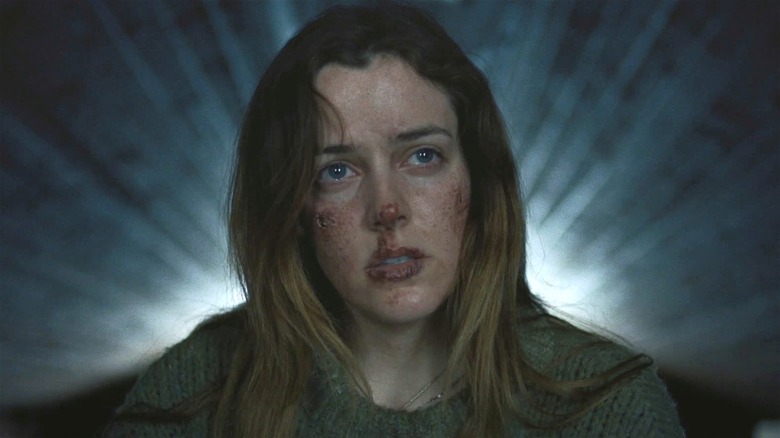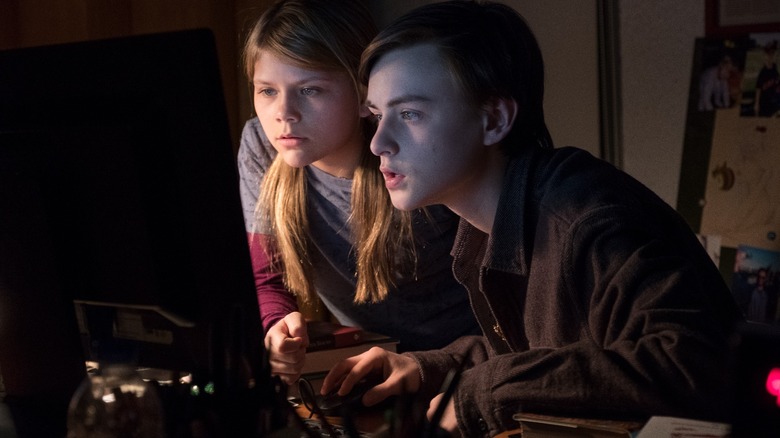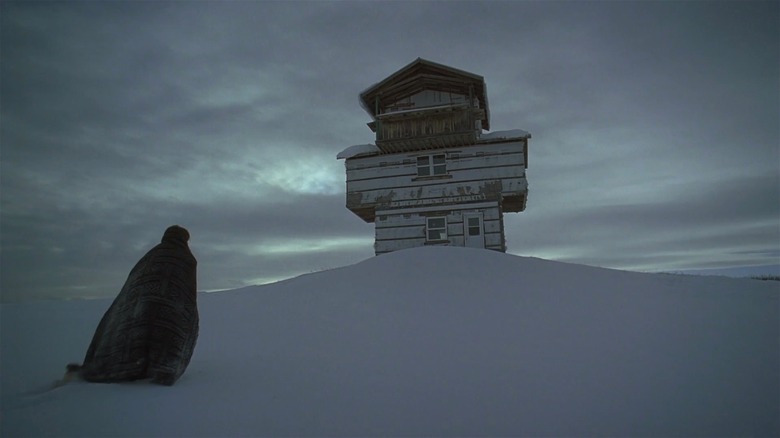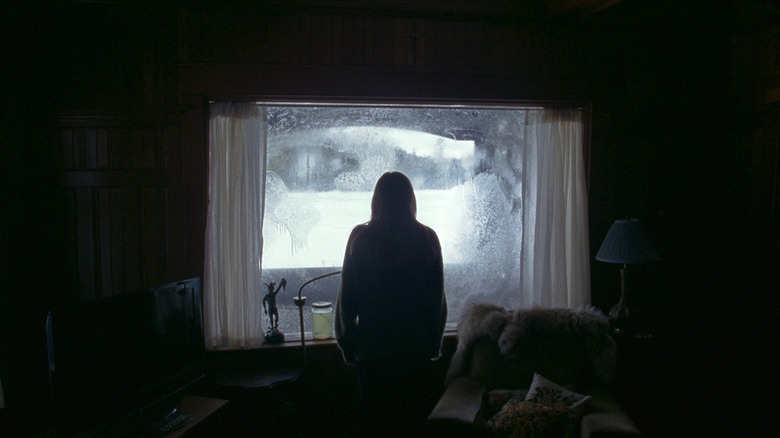The Lodge Ending Explained: Gaslit Into Purgatories Of Our Own Making
Complete and utter isolation can break the strongest of human minds, especially when coupled with the feeling of being boxed in without the choice to freely leave. One does not have to be secluded on their own to experience debilitating cabin fever, as the presence of others can breed feelings of paranoia and distrust, making the phenomenon highly contagious. At first, this appears to be the crux of "The Lodge," in which Grace (Riley Keough) and two children find themselves trapped in a wintry cabin in the middle of nowhere, with every basic necessity inexplicably vanishing into thin air. As they experience strange and unsettling events over time, psychosis sets in, intensifying the sense of derealization that permeates throughout the film. Just when things teeter over the edge, unsavory revelations undercut the very sense of reality (or unreality) that the film builds itself on.
In simple terms, the events of "The Lodge" is one excruciatingly tense gaslighting experience where Grace is manipulated into perceiving reality in a way that is meant to re-trigger her cult survivor trauma. While the children, Aiden (Jaeden Martell) and Mia (Lia McHugh), at first appear to be victims of some supernatural haunt or cosmic terror alongside Grace, the layers of truth are ripped off in the end when things spiral out of control. As hindsight allows us to re-evaluate the events of the film through this lens of objective truth, it's clear that we are also being gaslit alongside Grace, as we too are purposefully led astray and urged to second-guess our understanding of what might be truly occurring.
While the ending of "The Lodge" is pretty self-explanatory, it is worth diving into how we arrive at such a critical point of no return that weaves a trail of trauma and destruction in its wake.
The rot of silent resentment
One of the greatest weapons that "The Lodge" wields is its ability to suck the viewer into a world that is unique to its bleak setting: even before we set foot into the endless wintry landscape, something feels off from the get-go. Richard (Richard Armitage) helps reverse cult indoctrination for a living, and in a rather distasteful turn of events, he forms a romantic relationship with Grace, the only survivor of a mass cult suicide led by her father. This experience understandably leaves her scarred, but Richard's advances during such a precious recovery stage cannot help but raise several red flags, especially when the man already has a family, and unceremoniously declares divorce to his wife Laura (Alicia Silverstone).
Richard's affair has deadly repercussions, as Laura ends up dying by suicide. The children are devastated and silently resent their own father, and by extension, Grace, who is equally disturbed by Laura's death and harbors latent feelings of guilt that manifest horribly later on. "The Lodge" dramatizes the act of a family torn apart by resentment and terrible personal choices, and the process is slow and drawn out, symbolizing the rot that slowly takes hold of a person whose only outlet is to inflict the same damage they nurse within them.
As the children feel powerless against their own father, they redirect their attention to someone more vulnerable: Grace, whose cult-related trauma makes her especially sensitive to certain subjects. The children, who are acutely aware of her traumatic past, use it as a weapon to slowly drive her to the edge, employing religious symbols and recordings of her father's sermons to create an unreality that closes in on Grace over time. By the time the two realize that they've gone too far, it is too late.
Preying on latent trauma
The point of "The Lodge" is not to outrightly demonize Aiden and Mia for enacting their own twisted revenge for something they believe Grace is responsible for. The children lost an integral part of their lives after their mother's suicide, after all, and their only way to deal with this loss is to inflict the same brand of suffering by orchestrating a disorienting reality. However, it is equally important to acknowledge that the duo commits unforgivably cruel acts in the process when they use Grace's vulnerabilities against her in an attempt to satiate the need for retribution. Actions have consequences, and Aiden and Mia are mature enough to understand that their gaslighting schemes will break someone like Grace, but go ahead with it anyway until it comes back to bite them.
As for Richard, he is let off far too easily in a certain sense, as his death only serves to intensify the tragedy of the situation and does not allow him to reflect on his actions. While Richard might not have meant for those around him to suffer so deeply, his callous self-involvement hampers everyone around him, including his children, who are allowed to stymy in feelings that no child should ever have to experience.
The gruesome ending might have been entirely avoided if Richard had not made the insensitive decision to force the children to spend time with Grace in a remote cabin. While he might have had no way of anticipating what happened, this decision in itself reflects how utterly callous and myopic he is when it comes to getting his way without considering the feelings of everyone involved. In a way, Richard preys on Grace's trauma too, as making advances on a still-recovering survivor of trauma is neither professional nor considerate.
The cycle repeats
Growing up in a cult and experiencing years of indoctrination inevitably involves gaslighting and manipulation that distorts one's sense of self and their place in the world. Add religious guilt and militant ideas of sin and salvation to the mix, the end result is a lifetime of trauma, where healing is never steady or linear, leaving one acutely vulnerable. Grace might have had a solid chance to find herself had she been granted the opportunity to heal at her own pace — however, Laura's death, Richard's actions, and the events at the lodge trigger a psychological breakdown that employs her cult indoctrination as a bleak, tragic lens to parse the world around her. The children also pay the price for their actions, and while the end result is disproportionate to their crimes, it is an inevitability they helped trigger in the first place.
Grace also nurses loss in her own way throughout the film, with the death of her father and her cult members, whom she had considered family all of her life. When Aiden and Mia use audio-visual triggers to reopen her emotional wounds, Grace descends into a reality of her own, where guilt reigns supreme and the need to atone takes over her otherwise balanced, pragmatic mind. Distrust directly feeds into this schism, pointedly foreshadowed when the trio watches John Carpenter's "The Thing" right before all hell breaks loose — in Carpenter's film, identity is a malleable concept, tarnished by an external being, breeding paranoia among men torn apart over time.
In a tragic turn of events, Aiden's attempts at gaslighting Grace to sell the purgatory storyline inadvertently succeed. In the end, they are trapped in purgatories of their own making, branded by their own sense of guilt and despair that explodes into something more sinister.



